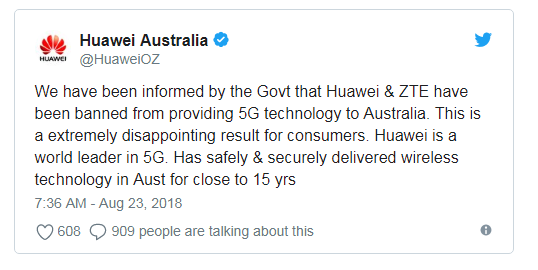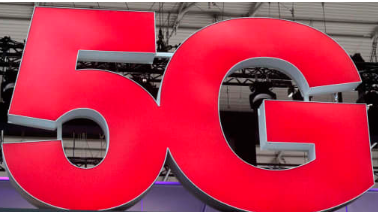- Ameya360 Component Supply Platform >
- Trade news >
- Spy agency chief addresses ban on Chinese telecoms in Australia's 5G rollout
Spy agency chief addresses ban on Chinese telecoms in Australia's 5G rollout
The head of an Australian intelligence agency has addressed the decision to exclude Chinese telecoms firms from the country's 5G rollout.
Speaking at the Australian Strategic Policy Institute national security dinner in Canberra on Monday, Mike Burgess, director general of the Australian Signals Directorate, said the exclusion was a matter of national security.
Burgess said his agency's purpose was to "protect Australians, our values and our way of life," dubbing the Chinese telecoms carriers "high-risk vendors."
He added that if 5G technology delivered on its promise, the next generation of telecommunications networks would be at the top of every country's list of critical national infrastructure, which could be at risk of data theft or infiltration.
"5G technology will underpin the communications that Australians rely on every day, from our health systems and the potential applications of remote surgery, to self-driving cars and through to the operation of our power and water supply. The stakes could not be higher," Burgess said.
"Historically, we have protected the sensitive information and functions at the core of our telecommunications networks by confining our high-risk vendors to the edge of our networks. But the distinction between core and edge collapses in 5G networks – that means that a potential threat anywhere in the network will be a threat to the whole network."
China's Huawei and ZTE were banned from providing 5G technology equipment to Australia in August.Twitter Ads info and privacy

Australia's government said at the time that it could not involve firms that were "subject to extrajudicial directions from a foreign government that conflict with Australian law" in its national 5G rollout.
Chinese smartphone manufacturers such as Huawei and ZTE are subject to legislation that requires citizens and businesses to cooperate with Chinese intelligence authorities.
Following the ban, Huawei criticised the Australian government, claiming the decision was politically motivated.
"It is not aligned with the long-term interests of the Australian people, and denies Australian businesses and consumers the right to choose from the best communications technology available," Huawei said in an emailed statement to CNBC.
5G mobile internet is widely predicted to revolutionise cities and future technologies such as autonomous vehicles, with many countries preparing for rollouts within the next few years.
However, adoption could be slowed by legislative red tape according to some experts. Federal Communications Commission Chairman Ajit Pai told CNBC's "Squawk on the Street" last month that regulation was holding back U.S. 5G deployment.
Huawei and ZTE are already prohibited from selling telecoms equipment in the U.S. due to national security concerns.
Online messageinquiry

5G Needs New Approach to Security

Partnership to Develop 5G Base Station Chip

5G: Huawei India CEO says open to provide source code for screening to allay security concerns

US has a 'concerted strategy' to push allies to reject Huawei's 5G equipment: Eurasia Group
- Week of hot material
- Material in short supply seckilling
| model | brand | Quote |
|---|---|---|
| MC33074DR2G | onsemi | |
| BD71847AMWV-E2 | ROHM Semiconductor | |
| RB751G-40T2R | ROHM Semiconductor | |
| TL431ACLPR | Texas Instruments | |
| CDZVT2R20B | ROHM Semiconductor |
| model | brand | To snap up |
|---|---|---|
| BU33JA2MNVX-CTL | ROHM Semiconductor | |
| IPZ40N04S5L4R8ATMA1 | Infineon Technologies | |
| BP3621 | ROHM Semiconductor | |
| STM32F429IGT6 | STMicroelectronics | |
| TPS63050YFFR | Texas Instruments | |
| ESR03EZPJ151 | ROHM Semiconductor |
- Week of ranking
- Month ranking
Qr code of ameya360 official account
Identify TWO-DIMENSIONAL code, you can pay attention to


Please enter the verification code in the image below:






















